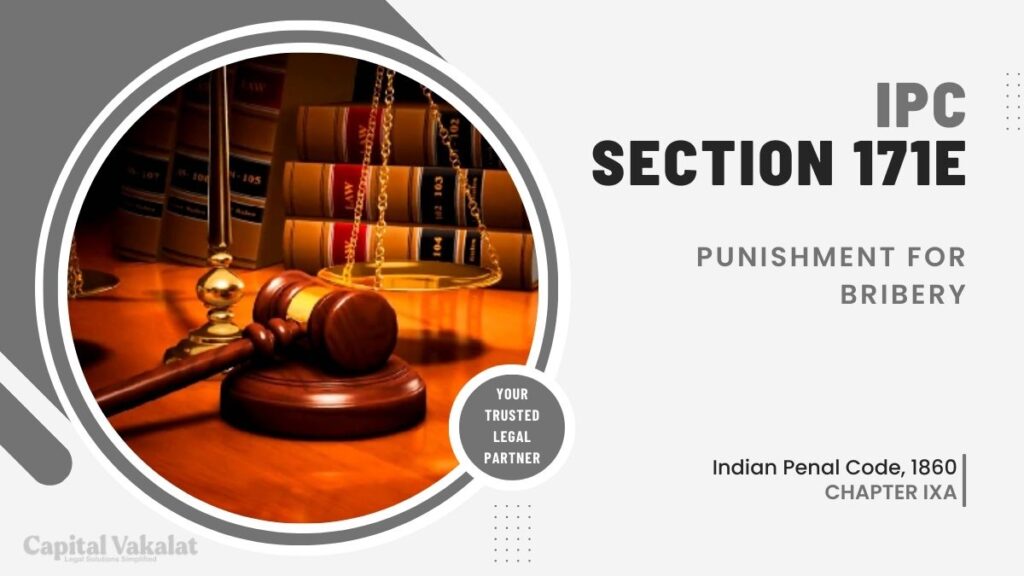In a world striving for transparency and accountability, laws against bribery play a crucial role. Section 171E of the Indian Penal Code (IPC) specifically deals with the offense of bribery and prescribes penalties for those found guilty.

In this article, we will explore the intricacies of Section 171E IPC, its historical context, legal framework, punishments, and the significance of this section in combating corruption.
Introduction
Bribery is a pervasive problem that hampers the progress and development of any nation. It erodes public trust and distorts fair competition. To counter this menace, the Indian legal system has enacted several provisions, and one of them is Section 171E of the IPC.
Understanding Section 171E IPC
Section 171E is a vital component of the IPC, focusing on punishing those involved in bribery. To understand it better, let’s break down its various aspects.
The Offense of Bribery
Bribery, in essence, involves offering, giving, receiving, or soliciting something of value to influence the actions of an official or other person in a position of power. It can range from small favors to large sums of money.
Historical Context
The battle against bribery is not new. Historically, societies have recognized the need to curb corruption. India, too, has a rich history of anti-corruption efforts.
Legal Framework
Section 171E is incorporated in the IPC, which is the principal criminal code in India. It is a part of the larger framework aimed at ensuring the rule of law and maintaining the sanctity of public offices.
Key Elements of Section 171E IPC
- Accepting or giving gratification: This section deals with the acceptance or offering of gratification to influence a public servant.
- Intention to induce or reward: The act must be with the intention to induce or reward the person for showing favor or disfavor in their official capacity.
- Public servant: The section is applicable to public servants, ensuring that those entrusted with public duties are not swayed by corrupt practices.
Punishments and Penalties
To deter individuals from indulging in bribery, the law prescribes strict punishments under Section 171E. These include imprisonment and fines. The severity of the punishment depends on the nature and extent of the offense.
Significance of the Section
The importance of Section 171E lies in its ability to hold individuals accountable for corrupt actions. It acts as a deterrent and promotes ethical conduct within the public sector.
Recent Cases and Precedents
To gain a deeper understanding of the application of this section, let’s examine some recent cases and legal precedents.
The Role of Transparency and Accountability
Transparency and accountability are vital in the fight against corruption. This section contributes to fostering these values in public administration.
Challenges in Implementing the Section
While the law is robust, its effective implementation can be challenging. Addressing these hurdles is crucial in the fight against corruption.
Preventive Measures
Preventing bribery is as important as punishing it. This section underscores the need for proactive measures to deter corruption.
Conclusion
In conclusion, Section 171E IPC serves as a powerful tool in the battle against bribery. It upholds the principles of transparency, accountability, and ethical governance. However, its success depends on effective enforcement and a commitment to eradicating corruption at all levels of society.
To stay updated on legal matters and learn more about Section 171E IPC, click here.
This article aims to shed light on the critical provisions of Section 171E IPC and its role in curbing bribery in India. Understanding and implementing this section is vital for a cleaner, more transparent society.
What are the penalties for a violation of Section 171E IPC?
Penalties may include imprisonment and fines, the severity of which depends on the nature and extent of the offense.
How does Section 171E contribute to transparency in governance?
By punishing those involved in bribery, Section 171E promotes ethical conduct and accountability in public administration.
Are there any recent landmark cases related to Section 171E IPC?
Yes, there have been cases in which individuals were prosecuted under this section, setting legal precedents.
What preventive measures can help combat bribery?
Preventive measures include promoting ethical values, education, and establishing transparent procedures in public administration.